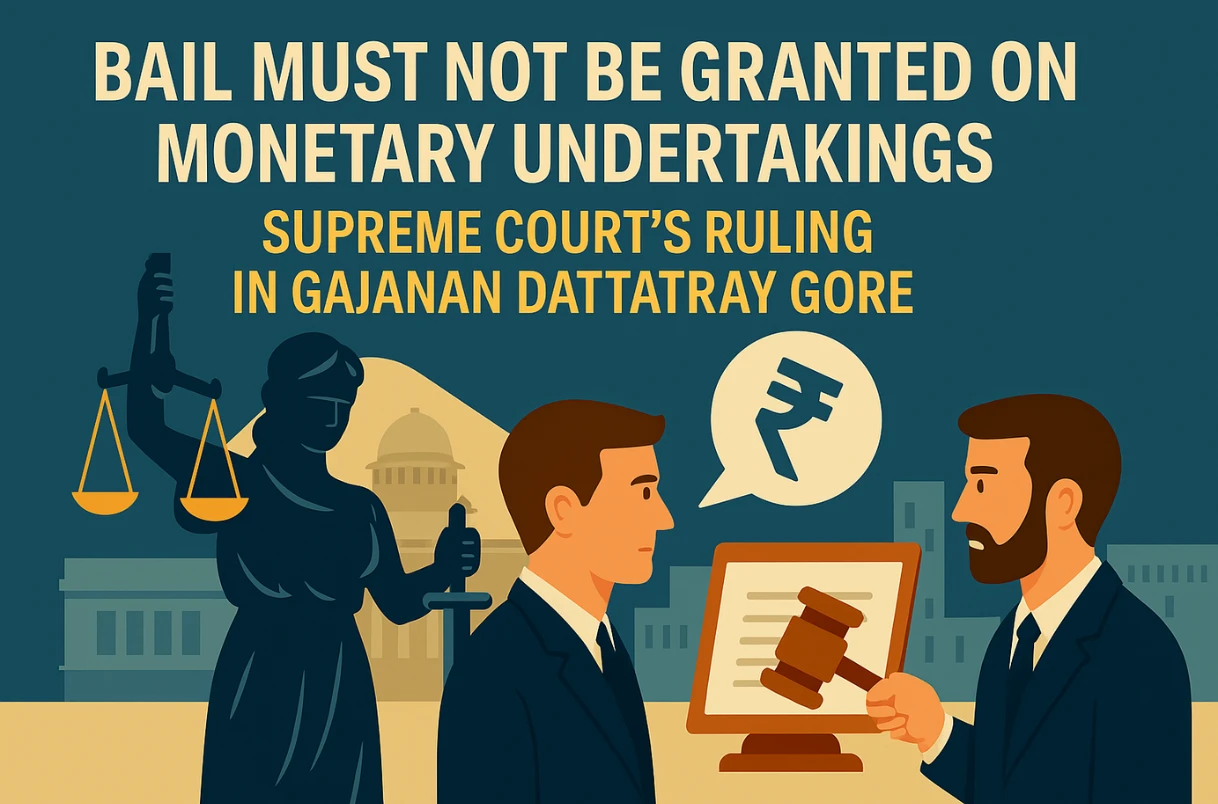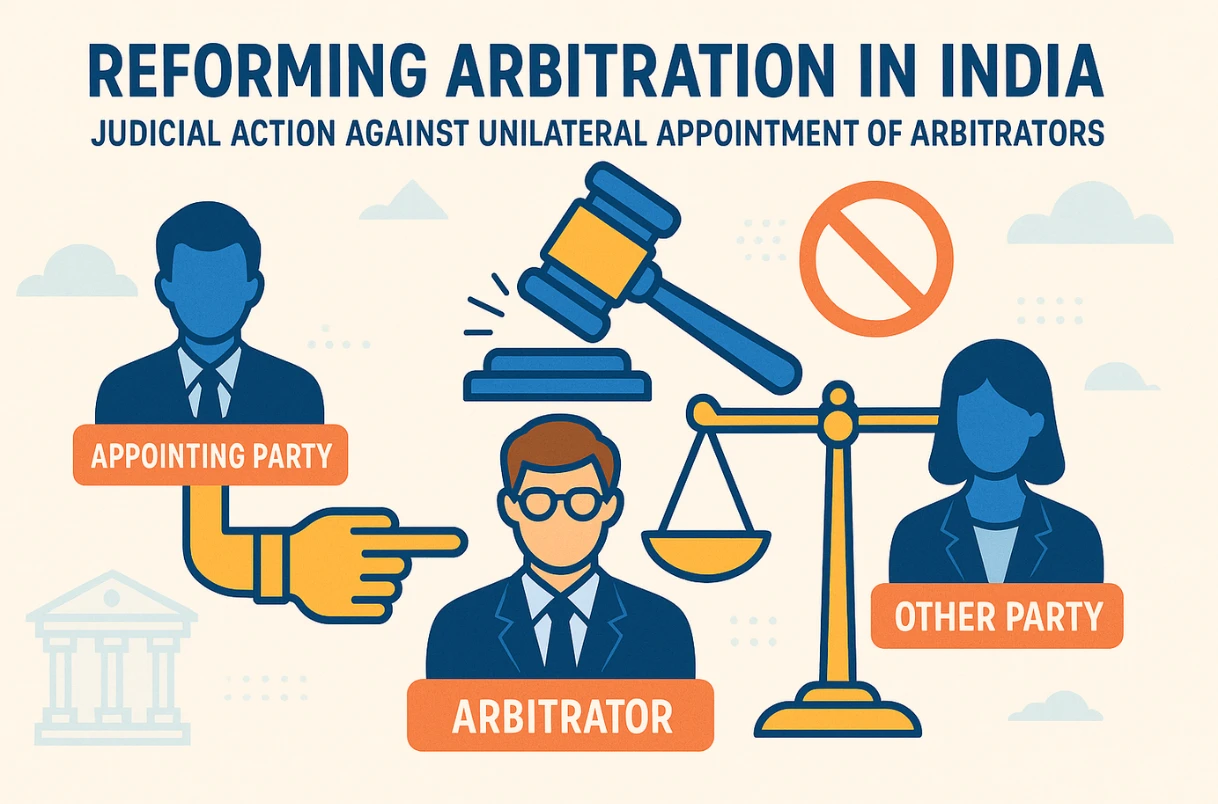Bail must not be granted on monetary undertakings: Supreme Court’s ruling in Gajanan Dattatray Gore

By – Sangeeth Narayanan and Debasmita Goswami
Table of Contents
Introduction
Recently, the Supreme Court in Gajanan Dattatray Gore1 issued strict directions to the trial courts and the High Courts that no trial court or High Court shall pass any order of grant of regular bail or anticipatory bail on an undertaking that the accused is ready to furnish any amount for the purpose of obtaining bail. The Supreme Court further directed the trial courts and High Courts to decide the plea for regular and anticipatory bail strictly on merits and not to exercise their discretion in this regard on any undertaking or statement that the accused may be ready and willing to make.
Before proceeding with a detailed analysis of the aforesaid judgement, let us see what the term bail means, what is the purpose or necessity of bail, what are the main provisions pertaining to the grant of bail and some standard conditions that are imposed by a court while releasing an accused on bail.
What Does “Bail” Mean in Indian Law?
Bail is a process whereby an accused charged with an offence is released from police or judicial custody upon ensuring that the accused remains present within the jurisdiction of the court and also ensuring future attendance before the court for trial. The term bail is defined under Section 2(1)(b) of the Bharatiya Nagarik Suraksha Sanhita, 2023 (BNSS)-
“bail” means release of a person accused or suspected of commission of an offence from the custody of law upon certain conditions imposed by an officer or Court on execution by such person of a bond or a bail bond
Why Is Bail Important?
The Indian Constitution gives paramount importance to personal liberty and freedom of an individual. Article 21 of the Constitution of India recognizes personal liberty as a fundamental right of an individual. Personal liberty includes freedom to move freely which is directly curtailed when a person is arrested and kept under custody, especially before the accusation of an alleged offence is proved against him. Therefore, the purpose of bail is to ensure that a person who is accused of committing an offence does not escape the jurisdiction of the court and is present before the court to face trial while at the same time, the personal liberty of the accused is not infringed following the principle of presumption of innocence until proven guilty.
Key Provisions Under BNSS on Grant of Bail
- Cases Where Bail Shall Be Taken – Section 478:
Section 478 of the BNSS2 deals with provisions where bail is to be taken. It provides that when any person other than a person accused of a non-bailable offence is arrested without warrant by an officer in charge of a police station, or appears or is brought before a Court, and is prepared at any time while in the custody of such officer or at any stage of the proceeding before such Court to give bail, such person shall be released on bail.
- Maximum period for which under-trial prisoner can be detained – Section 478:
Section 479 of the BNSS3 deals with the provisions pertaining to maximum period for which under-trial prisoner can be detained. Where a person has, during the period of investigation, inquiry or trial of an offence under any law undergone detention for a period extending up to one- half of the maximum period of imprisonment he shall be released by the Court on bail.
- Bail in Non-Bailable Offences – Section 480:
Section 480 of the BNSS4 deals with the provisions pertaining to when bail may be taken in case of non-bailable offence. Section 480 of BNSS provides that when any person accused of, or suspected of, the commission of any non-bailable offence is arrested or detained without warrant by an officer in charge of a police station or appears or is brought before a Court other than the High Court or Court of Session, he may be released on bail. Further, it also provides for cases where a person shall not be released on bail.
- Anticipatory Bail – Section 482:
Section 482 of the BNSS5 deals with the provisions pertaining to direction for grant of bail to person apprehending arrest. Under this Section, a High Court or a Sessions Court, if it thinks fit, can grant bail to a person who makes an application under this Section.
Standard Bail Conditions Imposed by Courts
While releasing an accused on bail, it is important to ensure that justice is delivered and hence the courts usually impose certain standard conditions while releasing the accused from custody. Some of the standard conditions imposed by courts are as follows:
Appearance before the court
As a condition to ensure that the accused remains within the jurisdiction of the trial court and that the accused is present to face the trial, the court usually require the accused to present themselves before the court in regular intervals.
Non-interference in investigation
As a step to ensure that the investigation against the accused is conducted in a proper manner, this is a standard condition imposed by the court while granting bail to an accused.
Travel restrictions
At times, the court, while granting bail to an accused, imposes travel restrictions on the accused whereby the accused is not allowed to travel outside the jurisdiction of the court without the previous approval of the court. This condition is imposed where the court deems that there is sufficient probability that the accused will remove himself from the jurisdiction of the trial court to evade the trial.
Surrender of passport
This is a drastic, though not an uncommon condition imposed by the court while granting bail to an accused. This condition is usually imposed by the court for economic offences, white collar crimes etc. This condition is generally imposed by the courts when it deems that there is a high probability that the accused will flee the country and evade the trial.
Supreme Court Judgment in Gajanan Dattatray Gore
Background of the Case
Supreme Court in the case of Gajanan Dattatray Gore has dealt with an issue wherein an accused was granted bail on the ground of monetary undertaking and subsequently the bail got cancelled and the accused was directed to surrender before the trial court on account of failure to fulfill the undertaking given by the accused.
The brief factual matrix of the case is that the accused was arrested and the trial Court declined to release the accused on regular bail. The accused thereafter appealed before Bombay High Court, that ordered release of the accused on bail subject to the deposit of Rs. 25,00,000/- in the Trial Court. The accused in the instant case had on his own free will and volition filed an affidavit in the form of an undertaking before the Bombay High Court that he would deposit an amount of Rs. 25,00,000/- but ultimately resiled to do so and the High Court had to cancel the bail.
Supreme Court’s Ruling and Observations
In this regard, the Supreme Court observed that no Trial Court or any of the High Courts shall pass any order of grant of regular bail or anticipatory bail on any undertaking that the accused might be ready to furnish for the purpose of obtaining appropriate reliefs. The High Courts as well as the Trial Courts shall decide the plea for regular bail or anticipatory bail strictly on the merits of the case. The High Courts and the Trial Courts shall not exercise their discretion in this regard on any undertaking or any statement that the accused may be ready and willing to make and the plea shall be decided strictly on merits in accordance with law.
The Supreme Court made observations regarding the instances where an accused would provide such kind of undertakings, however, at a later stage would not abide and flout the undertaking. In many cases, the accused would argue that such statements were not made by the accused and put the blame on the lawyer in making such statements for the purpose of obtaining bail.
Denouncement of Monetary Undertaking Practice
In the said Judgement, the Supreme Court has denounced the practice of releasing accused on bail on some monetary undertaking provided by the accused and categorically directed the Trial Courts and High Courts to not grant a single order of bail on the basis of an undertaking to deposit a particular amount given by an accused or his/her family member.
Why the Ruling Matters
Preventing Abuse of Process
By way of the judgement in Gajanan Dattatray Gore, the Supreme Court expressed significant concern over the practice of granting bail on voluntary financial undertakings by the accused persons. The Supreme Court highlighted the tendency of the accused claiming that the conditions imposed are onerous and renege on their undertaking. The Supreme Court highlighted that such incidents are nothing but mockery of justice and abuse of process of law.
Judicial Efficiency and Accountability
Another significant point which needs to be highlighted is that in cases, where an accused backoff from fulfilling the undertaking given by them, the natural outcome would be cancellation of the bail. Therefore, it results into wastage of precious judicial time.
It was made clear that bail cannot be secured solely on financial undertakings and that every bail application needs to be decided strictly on merits in accordance with law.
Restoring Public Confidence
The trend of accused providing financial undertaking to secure bail tends to create an impression that bail could be secured by depositing money. The judgement comes as a corrective measure to recast a proper image on the law on grant of bail and reaffirms the confidence of the citizens on judiciary.
Are All Monetary Undertakings Now Invalid?
Supreme Court’s Categorical Prohibition
The Supreme Court in Gajanan Dattatray Gore has made it sufficiently clear that not a single order of bail should be granted on the basis of an undertaking to deposit a particular amount given by an accused or his/her family member. On that basis, it would be proper to conclude that an undertaking to deposit money cannot be accepted even in a single case.
Possibility of Exception in Certain Cases
However, in our view, in exceptional cases where an allegation of misappropriation of public money is levelled against an accused, it should be open to the court to consider grant of bail if the accused undertakes to deposit the full or part of the money that he is accused of misappropriating. However, as observed by the Supreme Court in Ganajan Dattatray Gore, if at all a court decides to release an accused on bail on a monetary undertaking, the court should first ensure that the accused has deposited the amount within the stipulated period of time and only thereafter release the accused on bail.
Conclusion
The Supreme Court’s ruling in Gajanan Dattatray Gore sends a strong message that liberty cannot be bartered for money. By denouncing the practice of granting bail on financial undertakings, the Court has reinforced that bail must be grounded in legal merit – not monetary assurances. This judgment not only curbs potential misuse of judicial discretion but also restores public confidence in the fairness and integrity of the criminal justice system. Going forward, trial courts and High Courts are expected to uphold this principle with clarity and consistency.
FAQs
-
What did the Supreme Court rule in Gajanan Dattatray Gore vs State of Maharashtra (2025)?
In Gajanan Dattatray Gore v. State of Maharashtra (2025), the Supreme Court ruled that no trial court or High Court shall grant bail—whether regular or anticipatory—on the basis of a monetary undertaking by the accused or their family. The judgment came in response to a case where an accused was granted bail after giving an undertaking to deposit ₹25,00,000 but later failed to fulfill that promise. As a result, the bail was cancelled, and the accused was directed to surrender.
Taking serious note of this practice, the Supreme Court held that bail must be decided strictly on legal merits, not on financial assurances or voluntary statements made by the accused. The Court criticized the growing trend where accused persons use monetary promises to secure bail, only to later claim the statements were made under pressure or miscommunication. It emphasized that such practices mock the judicial process and amount to abuse of court discretion.
The Court’s ruling is significant in reinforcing that bail is a matter of legal right and judicial satisfaction, not a transaction, and any application must be assessed solely on the basis of law and facts.
-
Can bail be granted based on a monetary undertaking in India?
Supreme Court in the case of Gajanan Dattatray Gore has dealt with an issue wherein an accused was granted bail on the ground of monetary undertaking and subsequently the bail got cancelled and the accused was directed to surrender before the trial court on account of failure to fulfill the undertaking given by the accused. In the said Judgement, the Supreme Court has denounced the practice of releasing accused on bail on some monetary undertaking provided by the accused and categorically directed the Trial Courts and High Courts to not grant a single order of bail on the basis of an undertaking to deposit a particular amount given by an accused or his/her family member.
-
Why did the Supreme Court prohibit bail based on financial conditions?
The Supreme Court prohibited the bail based on financial undertakings considering the tendency of the accused claiming that the conditions imposed are onerous and renege on their undertaking, wastage of judicial time in case an accused backoff from fulfilling the financial undertaking given by them which would ultimately lead to cancellation of bail etc.
-
What are the key provisions on bail under BNSS 2023?
The Bharatiya Nagarik Suraksha Sanhita, 2023 (BNSS) outlines several provisions related to the grant of bail, balancing the rights of the accused with the interests of justice.
Section 478 of the BNSS deals with cases where bail is to be taken. It states that when any person—other than someone accused of a non-bailable offence—is arrested without a warrant or appears before a court and is prepared to furnish bail at any stage, such person shall be released on bail. This ensures that individuals accused of less serious offences are not unnecessarily detained.
Section 479 addresses the maximum period for which an undertrial prisoner can be detained. If a person has been in custody during investigation, inquiry, or trial for up to half the maximum sentence prescribed for the offence, the court is required to release them on bail. This provision is aimed at preventing prolonged pre-trial incarceration.
Section 480 covers the conditions under which bail may be granted in cases of non-bailable offences. It allows courts, other than the High Court or Court of Session, to release the accused on bail if the offence is non-bailable. However, it also outlines situations where bail must not be granted, maintaining judicial discretion in serious cases.
Section 482 deals with anticipatory bail, allowing individuals who apprehend arrest to apply for bail before they are taken into custody. This power is vested in the High Court or Sessions Court, which may grant anticipatory bail if it finds merit in the application, subject to such conditions as deemed appropriate.
These provisions collectively define the framework for securing bail under BNSS 2023 and reinforce the principles of fairness, liberty, and due process in India’s criminal justice system.
-
What is the purpose of bail under Indian law?
The Indian Constitution gives paramount importance to personal liberty and freedom of an individual. Article 21 of the Constitution of India recognizes personal liberty as a fundamental right of an individual. Personal liberty includes freedom to move freely which is directly curtailed when a person is arrested and kept under custody, especially before the accusation of an alleged offence is proved against him. Therefore, the purpose of bail is to ensure that a person who is accused of committing an offence does not escape the jurisdiction of the court and is present before the court to face trial while at the same time, the personal liberty of the accused is not infringed following the principle of presumption of innocence until proven guilty.
-
How does Article 21 of the Indian Constitution relate to bail?
Article 21 of the Constitution of India recognizes personal liberty as a fundamental right of an individual. Personal liberty includes freedom to move freely which is directly curtailed when a person is arrested and kept under custody, especially before the accusation of an alleged offence is proved against him. Therefore, the purpose of bail is to ensure that a person who is accused of committing an offence does not escape the jurisdiction of the court and is present before the court to face trial while at the same time, the personal liberty of the accused is not infringed following the principle of presumption of innocence until proven guilty.
-
What standard conditions can courts impose while granting bail?
Appearance before the court, Non-interference in investigation, Travel restrictions, Surrender of passport are some of the standard conditions while releasing the accused from custody.
-
Can anticipatory bail be linked to monetary deposits?
As per the ruling of the Supreme Court in Gajanan Dattatray Gore, no kind of bail whether anticipatory or regular bail can be granted solely on the basis of monetary undertakings.
-
What happens if an accused fails to honor a financial undertaking for bail?
When an accused fails to honour the financial undertaking provided for securing bail, the natural outcome would be cancellation of the bail.
-
Does the Supreme Court allow any exceptions for bail on financial grounds?
Though the Supreme Court has not categorically exempted any instances for bail on financial grounds, however, there could be exceptions such as cases involving misappropriation of public funds etc. However, the Supreme Court in Gajanan Dattatray Gore has held that if at all a court decides to release an accused on bail on a monetary undertaking, the court should first ensure that the accused has deposited the amount within the stipulated period of time and only thereafter release the accused on bail
References –
- Gajanan Dattatray Gore vs. State of Maharashtra and Anr. 2025 SCC OnLine SC 1571
- https://indiankanoon.org/doc/6768246/
- https://indiankanoon.org/doc/87702491/
- https://indiankanoon.org/doc/172895630/
- https://indiankanoon.org/doc/73182733/


